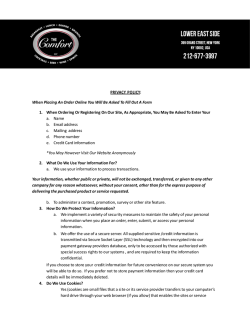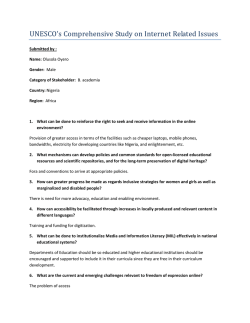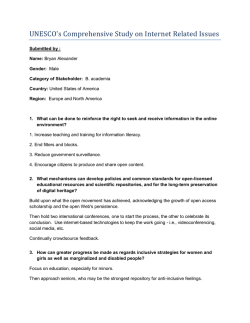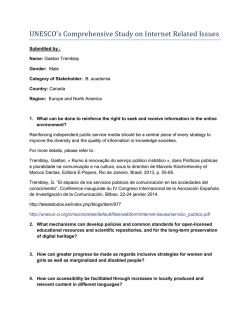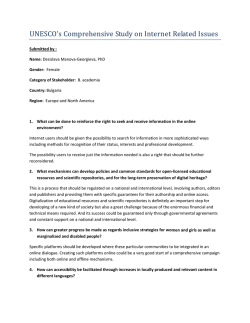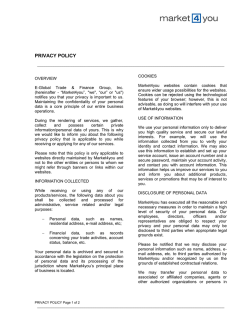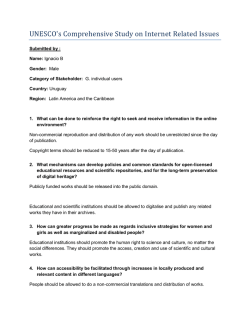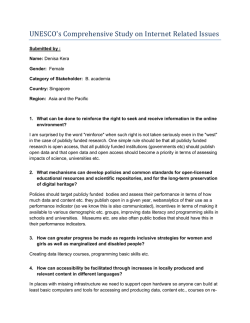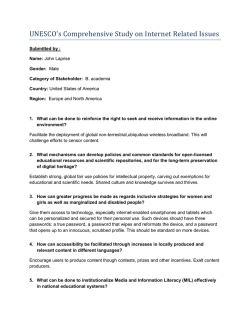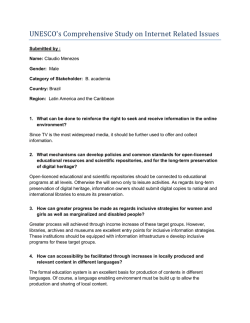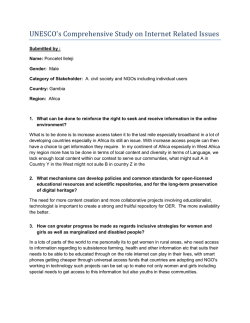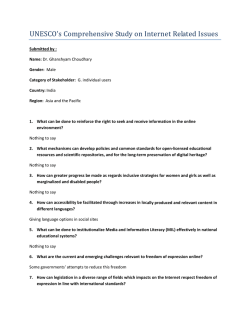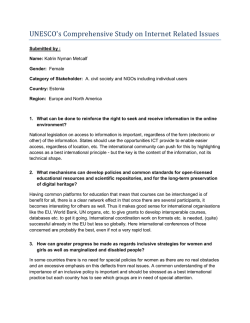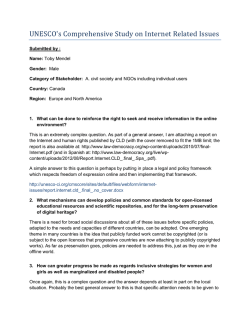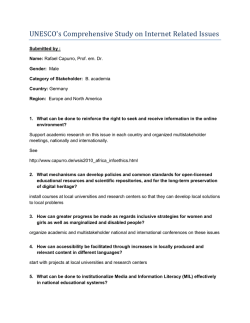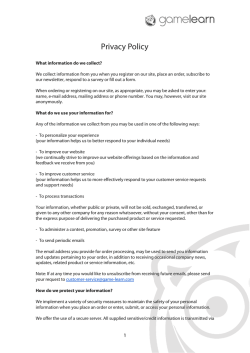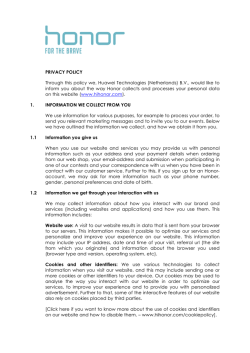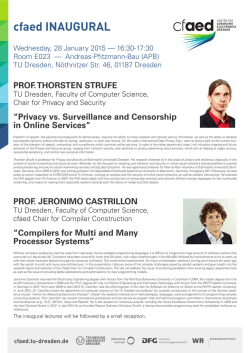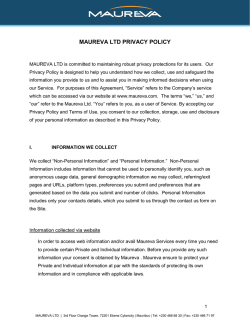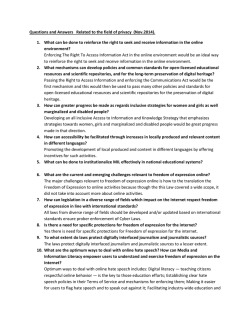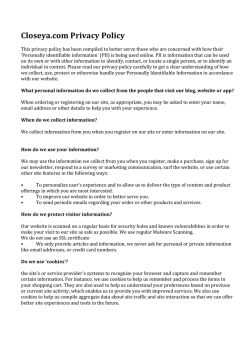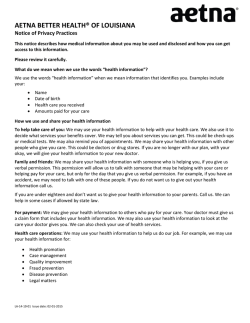
Byakatonda Simon Peter
UNESCO's Comprehensive Study on Internet Related Issues Submitted by : Name: Byakatonda Simon Peter Gender: Male Category of Stakeholder: C. private sector Country: Uganda Region: Africa 1. What can be done to reinforce the right to seek and receive information in the online environment? A general awareness campaign has to be carried out for the masses to be fully reached. This can involve electronic media, print, door-to-door media and the use of phone contacts for SMS and calls 2. What mechanisms can develop policies and common standards for open-licensed educational resources and scientific repositories, and for the long-term preservation of digital heritage? In Uganda, this can be achieved through the use of the set legislative structures and the formal education systems plus making full utilization of the justice department. 3. How can greater progress be made as regards inclusive strategies for women and girls as well as marginalized and disabled people? By hyping the participatory tool among communities so that people are used to plan for their futures. 4. How can accessibility be facilitated through increases in locally produced and relevant content in different languages? This is where the role of electronic media i.e. radio and television is most importantly needed. this should be strengthened in all communities. Probably small community radios say of 50 mile radius should be set up to create nucleus convergence zones where local and indigenous languages are strengthened. 5. What can be done to institutionalize Media and Information Literacy (MIL) effectively in national educational systems? 6. What are the current and emerging challenges relevant to freedom of expression online? There is too much freedom of expression on face book that people end up abusing the medium. Face book should block those who are overly uncontrolled in the way they express themselves. 7. How can legislation in a diverse range of fields which impacts on the Internet respect freedom of expression in line with international standards? The first step should be for legislation to go IT compliant not always to seem out of the scope of international communication lines. Up to now there are some legislators who do not know what to do in front of an open internet browser. 8. Is there a need for specific protections for freedom of expression for the Internet? Yes there surely is especially to curb illicit behavior. 9. To what extent do laws protect digitally interfaced journalism and journalistic sources? In Uganda it is very minimal or even not addressed at all. 10. What are the optimum ways to deal with online hate speech? How can Media and Information Literacy empower users to understand and exercise freedom of expression on the Internet? I think the primary need here is to teach them to learn about morality and be considerate to all users since some are under age. 11. What are the optimum systems for independent self-regulation by journalistic actors and intermediaries in cyberspace? the greatest optimum system in this is the computer security that ensures unwanted websites are not opened. This is possible if you take a course in computer security 12. What principles should ensure respect for the right to privacy? integrity, respect of others, and the objective moral law "Do good and avoid evil" 13. What is the relationship between privacy, anonymity and encryption? All three are joined by protectionism and value for personal issues. In other words all show respect for individual security of ideas. 14. What is the importance of transparency around limitations of privacy? That one takes things privately should not work against that value for being transparent. Transparency enhances privacy to bring out the respect a person portrays. 15. What kinds of arrangements can help to safeguard the exercise of privacy in relation to other rights? Ensure total cyber security in any setting. Train people to value the underlying values of privacy as a right. 16. How can openness and transparency of data be reconciled with privacy? One can tag the value of privacy but at the same time be transparent. However, when openness comes in some things have to be omitted. Otherwise the term privacy will cease to bear any meaning. 17. What may be the impact of issues relating to big data on respect for privacy? Big data can be protected against vandalism but total privacy cannot be observed. A certain level of public display will be allowed. 18. How can security of personal data be enhanced? Teaching/training of people to uphold security in everything they do online and also in avoiding malware or attacks from dangerous people. The biggest majority of these are those who have no knowledge about security because they infect your computer without knowing they have done something harmful to your data. 19. How can Media and Information Literacy be developed to assist individuals to protect their privacy? through creation of individual awareness of the privacy policy. 20. How can ethical principles based on international human rights advance accessibility, openness, and multi-stakeholder participation on the Internet? By creating awareness on the objective moral law given to us by God 21. What conceptual frameworks or processes of inquiry could serve to analyse, assess, and thereby inform the choices that confront stakeholders in the new social uses and applications of information and knowledge? character research 22. How does ethical consideration relate to gender dimensions of the Internet? I think respect for humanity is paramount here. 23. How can ethics, - i.e. the simultaneous affirmation of human rights, peace, equity, and justice - inform law and regulation about the Internet? By practical application of the laws about internet. 24. What international, regional and national frameworks, normative guidelines and accountability mechanisms exist of relevance to one or more fields of the study? Love of God and mankind. the mechanism lies in the Bible. All legal frameworks adhere to this in one way or the other. 25. How do cross-jurisdictional issues operate with regard to freedom of expression and privacy? But how do you expect cross-jurisdiction to operate on grounds of privacy? There is freedom of expression in so far as the answers are concerned but where issues become sour that freedom is greatly compromised. 26. What are the intersections between the fields of study: for example, between access and freedom of expression; ethics and privacy; privacy and freedom of expression; and between all four elements? 27. What pertinent information materials exist that cut across or which are relevant to the four fields of the study? security, respect, love and humanitarianism 28. What might be the options for role of UNESCO within the wider UN system in regard to the distinct issues of online Access to information and knowledge, Freedom of Expression, Privacy and Ethical dimensions of the information society? care for humanity, brotherhood and team work in service 29. What might be options for the role of UNESCO in relation to stakeholders outside the UN system? Respect for morals, a deep understanding of the super structure and the love to disseminate truth-bound information without bias 30. For each study field, what specific options might UNESCO Member States consider? Access to information: Institute a control mechanism to guard against defamatory information from the public. Freedom of expression: Allow free access to the website and allow contributions that are guided by a technical person. Privacy: Install a security system and training all staff members to understand perfectly how to use it and protect the organisation from cyber attacks.
© Copyright 2026
